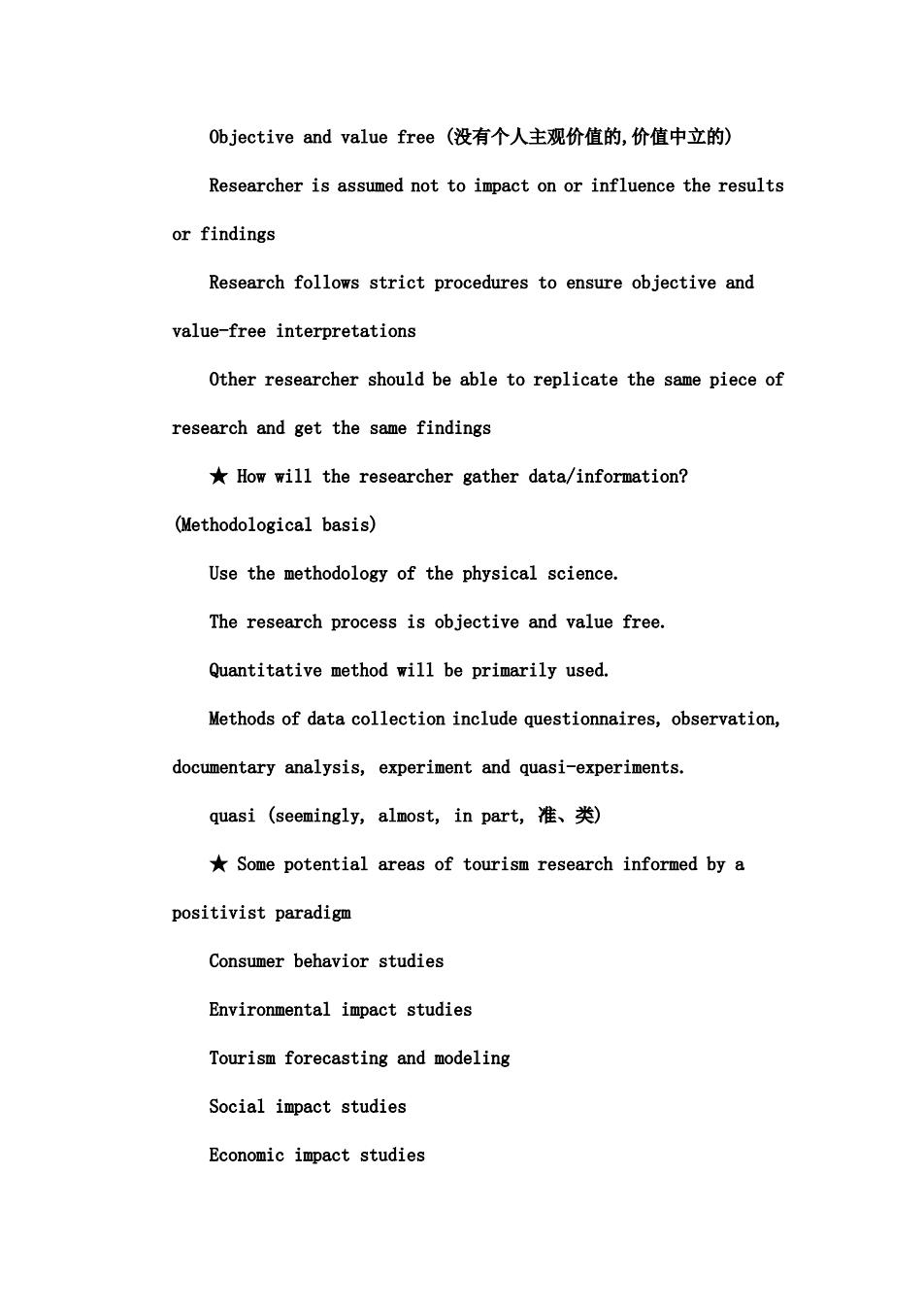
0 bjective and value free(没有个人主观价值的,价值中立的) Researcher is assumed not to impact on or influence the results or findings Research follows strict procedures to ensure objective and value-free interpretations Other researcher should be able to replicate the same piece of research and get the same findings How will the researcher gather data/information? (Methodological basis) Use the methodology of the physical science. The research process is objective and value free. Quantitative method will be primarily used. Methods of data collection include questionnaires,observation, documentary analysis,experiment and quasi-experiments. quasi(seemingly,,almost,in part,准、类) Some potential areas of tourism research informed by a positivist paradigm Consumer behavior studies Environmental impact studies Tourism forecasting and modeling Social impact studies Economic impact studies
Objective and value free (没有个人主观价值的,价值中立的) Researcher is assumed not to impact on or influence the results or findings Research follows strict procedures to ensure objective and value-free interpretations Other researcher should be able to replicate the same piece of research and get the same findings ★ How will the researcher gather data/information? (Methodological basis) Use the methodology of the physical science. The research process is objective and value free. Quantitative method will be primarily used. Methods of data collection include questionnaires, observation, documentary analysis, experiment and quasi-experiments. quasi (seemingly, almost, in part, 准、类) ★ Some potential areas of tourism research informed by a positivist paradigm Consumer behavior studies Environmental impact studies Tourism forecasting and modeling Social impact studies Economic impact studies
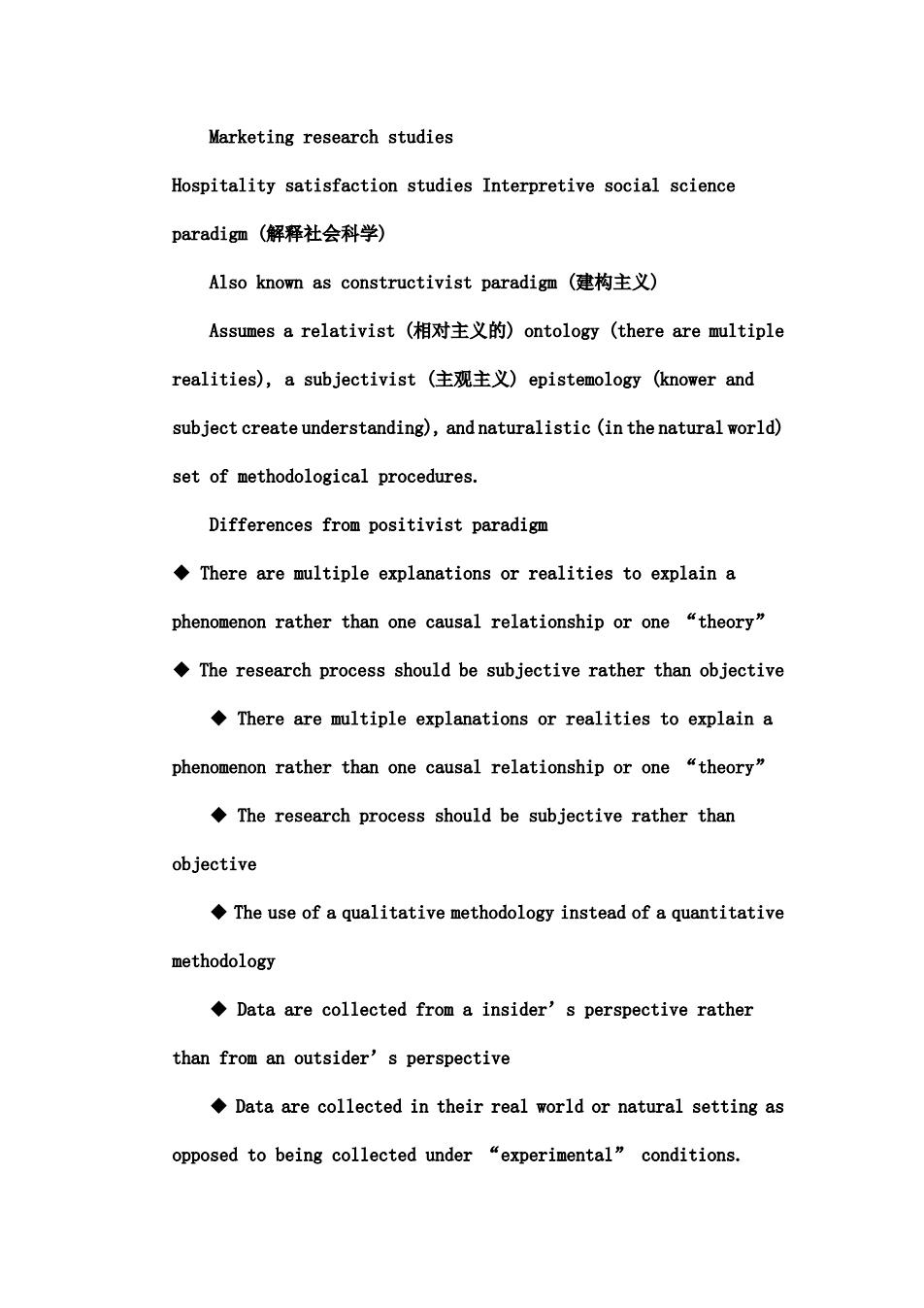
Marketing research studies Hospitality satisfaction studies Interpretive social science paradigm(解释社会科学) Also known as constructivist paradigm(建构主义) Assumes a relativist(相对主义的)ontology(there are multiple realities),a subjectivist(住观主义)epistemology(knower and subject create understanding),and naturalistic (in the natural world) set of methodological procedures. Differences from positivist paradigm There are multiple explanations or realities to explain a phenomenon rather than one causal relationship or one "theory" The research process should be subjective rather than objective There are multiple explanations or realities to explain a phenomenon rather than one causal relationship or one "theory" The research process should be subjective rather than objective The use of a qualitative methodology instead of a quantitative methodology Data are collected from a insider's perspective rather than from an outsider's perspective Data are collected in their real world or natural setting as opposed to being collected under "experimental"conditions
Marketing research studies Hospitality satisfaction studies Interpretive social science paradigm (解释社会科学) Also known as constructivist paradigm (建构主义) Assumes a relativist (相对主义的) ontology (there are multiple realities), a subjectivist (主观主义) epistemology (knower and subject create understanding), and naturalistic (in the natural world) set of methodological procedures. Differences from positivist paradigm ◆ There are multiple explanations or realities to explain a phenomenon rather than one causal relationship or one “theory” ◆ The research process should be subjective rather than objective ◆ There are multiple explanations or realities to explain a phenomenon rather than one causal relationship or one “theory” ◆ The research process should be subjective rather than objective ◆ The use of a qualitative methodology instead of a quantitative methodology ◆ Data are collected from a insider’s perspective rather than from an outsider’s perspective ◆ Data are collected in their real world or natural setting as opposed to being collected under “experimental” conditions
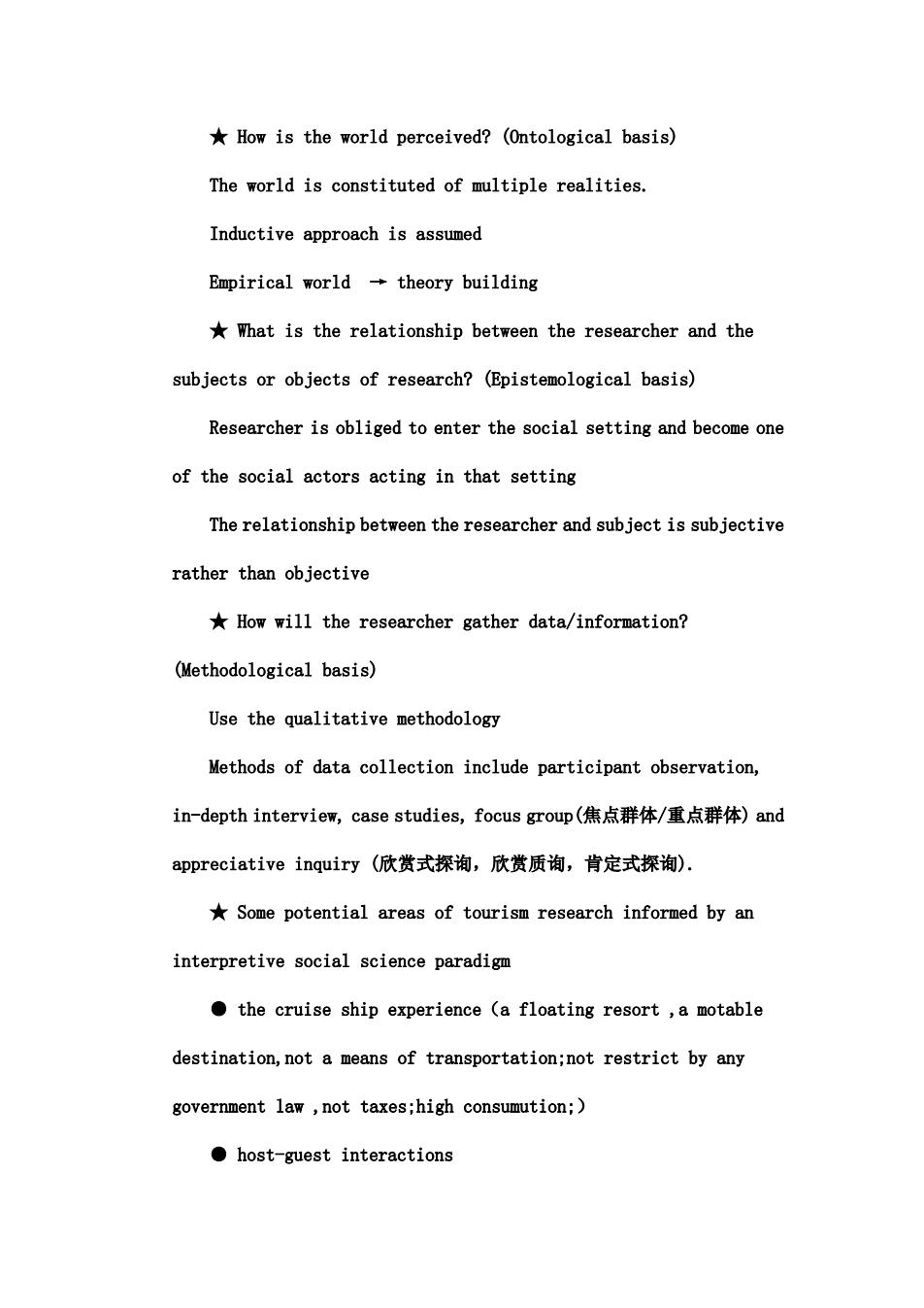
How is the world perceived?(Ontological basis) The world is constituted of multiple realities. Inductive approach is assumed Empirical world theory building What is the relationship between the researcher and the subjects or objects of research?(Epistemological basis) Researcher is obliged to enter the social setting and become one of the social actors acting in that setting The relationship between the researcher and subject is subjective rather than objective How will the researcher gather data/information? (Methodological basis) Use the qualitative methodology Methods of data collection include participant observation, in-depth interview,.case studies,.focus group(焦点群体/重点群体)and appreciative inquiry(欣赏式探询,欣赏质询,肯定式探询). Some potential areas of tourism research informed by an interpretive social science paradigm the cruise ship experience (a floating resort a motable destination,not a means of transportation:not restrict by any government law,not taxes;high consumution;) host-guest interactions
★ How is the world perceived? (Ontological basis) The world is constituted of multiple realities. Inductive approach is assumed Empirical world → theory building ★ What is the relationship between the researcher and the subjects or objects of research? (Epistemological basis) Researcher is obliged to enter the social setting and become one of the social actors acting in that setting The relationship between the researcher and subject is subjective rather than objective ★ How will the researcher gather data/information? (Methodological basis) Use the qualitative methodology Methods of data collection include participant observation, in-depth interview, case studies, focus group(焦点群体/重点群体) and appreciative inquiry (欣赏式探询,欣赏质询,肯定式探询). ★ Some potential areas of tourism research informed by an interpretive social science paradigm ● the cruise ship experience(a floating resort ,a motable destination,not a means of transportation;not restrict by any government law ,not taxes;high consumution;) ● host-guest interactions
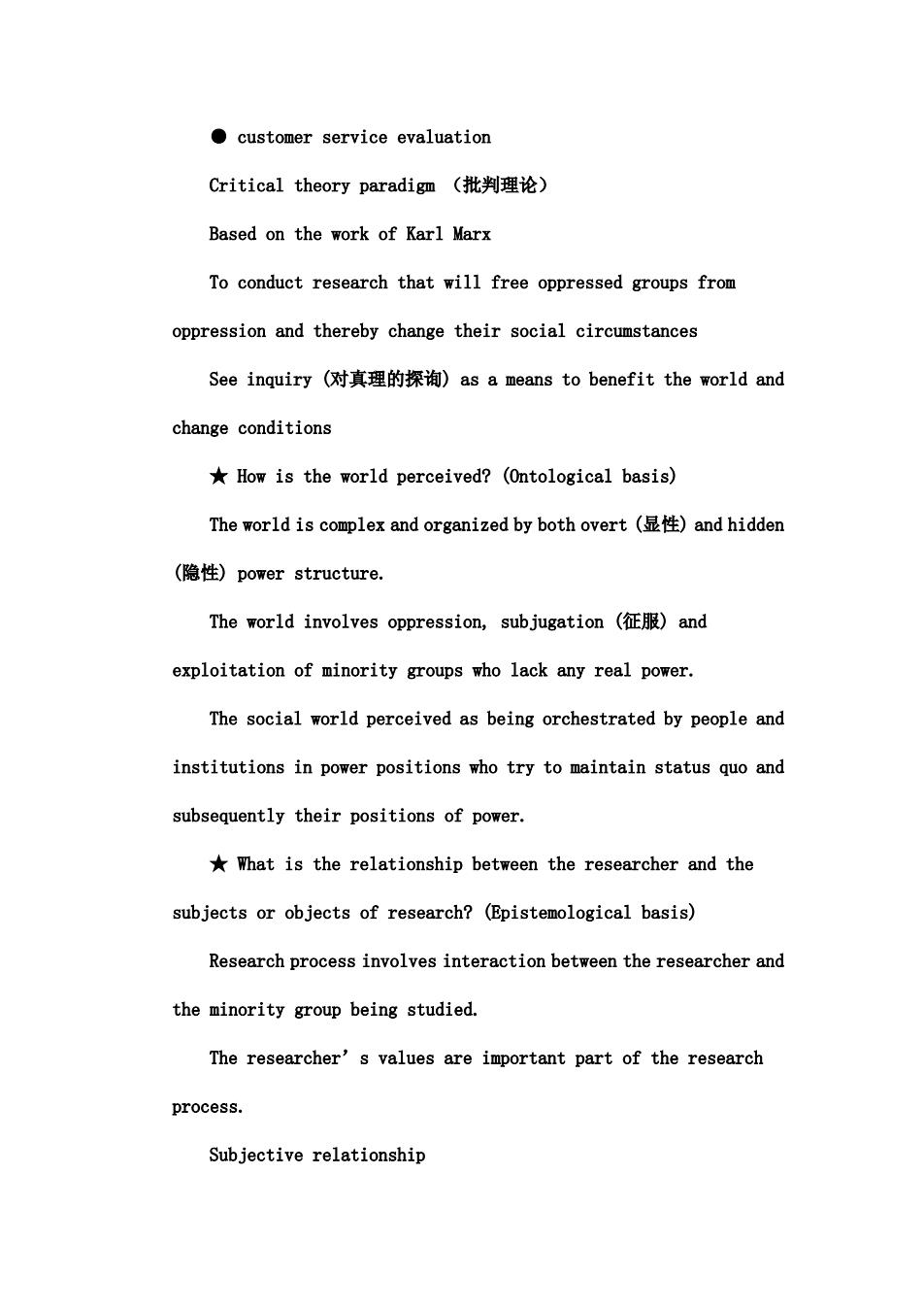
customer service evaluation Critical theory paradigm(批判理论) Based on the work of Karl Marx To conduct research that will free oppressed groups from oppression and thereby change their social circumstances See inquiry(对真理的探询)as a means to benefit the world and change conditions How is the world perceived?(Ontological basis) The world is complex and organized by both overt and hidden (隐性)power structure. The world involves oppression,subjugation (and exploitation of minority groups who lack any real power. The social world perceived as being orchestrated by people and institutions in power positions who try to maintain status quo and subsequently their positions of power What is the relationship between the researcher and the subjects or objects of research?(Epistemological basis) Research process involves interaction between the researcher and the minority group being studied. The researcher's values are important part of the research process. Subjective relationship
● customer service evaluation Critical theory paradigm (批判理论) Based on the work of Karl Marx To conduct research that will free oppressed groups from oppression and thereby change their social circumstances See inquiry (对真理的探询) as a means to benefit the world and change conditions ★ How is the world perceived? (Ontological basis) The world is complex and organized by both overt (显性) and hidden (隐性) power structure. The world involves oppression, subjugation (征服) and exploitation of minority groups who lack any real power. The social world perceived as being orchestrated by people and institutions in power positions who try to maintain status quo and subsequently their positions of power. ★ What is the relationship between the researcher and the subjects or objects of research? (Epistemological basis) Research process involves interaction between the researcher and the minority group being studied. The researcher’s values are important part of the research process. Subjective relationship
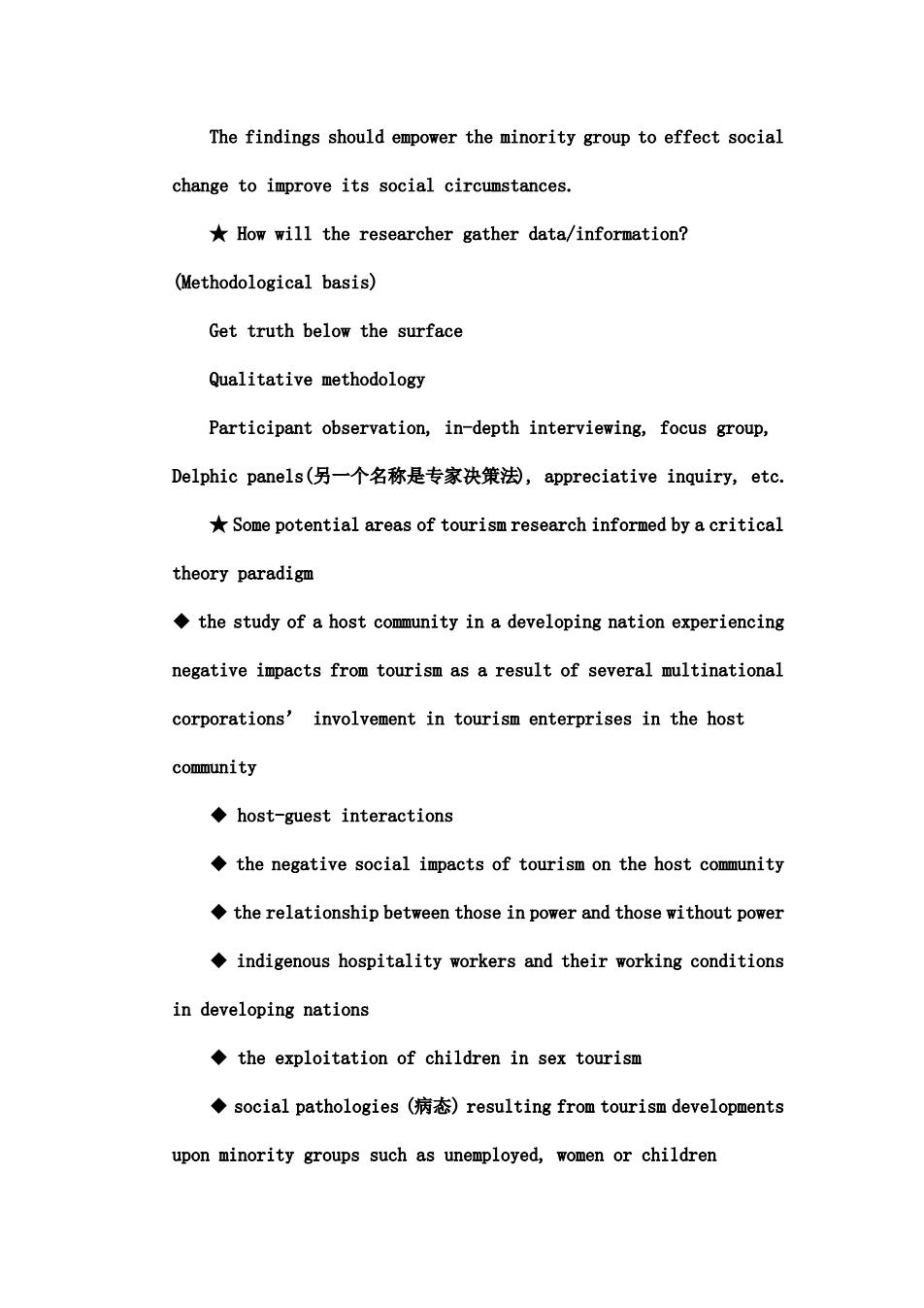
The findings should empower the minority group to effect social change to improve its social circumstances How will the researcher gather data/information? (Methodological basis) Get truth below the surface Qualitative methodology Participant observation,in-depth interviewing,focus group, Delphic panels(另一个名称是专家决策浅,appreciative inquiry,etc, Some potential areas of tourism research informed by a critical theory paradigm the study of a host community in a developing nation experiencing negative impacts from tourism as a result of several multinational corporations'involvement in tourism enterprises in the host community host-guest interactions the negative social impacts of tourism on the host community the relationship between those in power and those without power indigenous hospitality workers and their working conditions in developing nations the exploitation of children in sex tourism ◆social pathologies(病态)resulting from tourism developments upon minority groups such as unemployed,women or children
The findings should empower the minority group to effect social change to improve its social circumstances. ★ How will the researcher gather data/information? (Methodological basis) Get truth below the surface Qualitative methodology Participant observation, in-depth interviewing, focus group, Delphic panels(另一个名称是专家决策法), appreciative inquiry, etc. ★ Some potential areas of tourism research informed by a critical theory paradigm ◆ the study of a host community in a developing nation experiencing negative impacts from tourism as a result of several multinational corporations’ involvement in tourism enterprises in the host community ◆ host-guest interactions ◆ the negative social impacts of tourism on the host community ◆ the relationship between those in power and those without power ◆ indigenous hospitality workers and their working conditions in developing nations ◆ the exploitation of children in sex tourism ◆ social pathologies (病态) resulting from tourism developments upon minority groups such as unemployed, women or children